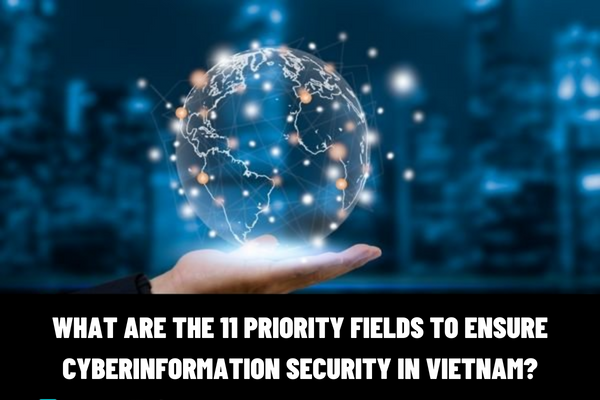What is cyberinformation security in Vietnam? What are the 11 priority fields to ensure cyberinformation security?
What is cyberinformation security in Vietnam?
Pursuant to Clause 1, Article 3 of the 2015 Law on Cyberinformation Security in Vietnam stipulating cyberinformation security as follows:
Cyberinformation security means the protection of information and information systems in cyberspace from being illegally accessed, utilized, disclosed, interrupted, altered or sabotaged in order to ensure the integrity, confidentiality and usability of information.

What is cyberinformation security in Vietnam? What are the 11 priority fields to ensure cyberinformation security? (Image from the Internet)
What are the 11 priority fields to ensure cyberinformation security in Vietnam?
Pursuant to Section 1 of Directive No. 18/CT-TTg in 2022 and Section 2 of Directive No. 18/CT-TTg in 2022, it clearly states 11 priority fields to ensure cyberinformation security, including:
- Presiding agencies of 11 important fields whose cybersecurity assurance needs to be prioritized (according to Decision No. 632/QD-TTg dated May 10, 2017) shall pay attention to share information on risks and emergencies of cyber insecurity to entities managing and operating the information systems of the related fields and promptly and effectively support the CERTs of the related fields.
- The CERTs shall perform the following regular tasks: acting as the focal point to receive and manage emergencies; making response, handling emergencies and detecting threats; researching and monitoring risks of cyberattacks, information on vulnerabilities; practicing skills to protect the information systems and participating in trainings and drills chaired by the National Coordinating Agency.
- They must sufficiently allocate assurance funds to the CERTs; attract high-quality human resources to participate in response to cybersecurity emergencies.
- The Ministry of Information and Communications of Vietnam shall provide instructions on development of the CERTs for 11 important fields whose cybersecurity assurance needs to be prioritized according to Decision No. 632/QD-TTg dated May 10, 2017 of the Prime Minister; Provide instructions on implementation of regular activities of the CERTs and build a CERT services framework before November 30, 2022.
- Promote actual-combat drills of cybersecurity at agencies, organizations and enterprises; use results of the drills as a criterion to evaluate the maturity and professionalism of the CERTs every year; Preside over implementation, instructions, monitoring, urge, inspection and evaluation of the implementation of this Directive; consolidate results of the implementation and report them to the Prime Minister.
- The Ministry of Public Security and Ministry of National Defense shall make response to cybersecurity emergencies according to their assigned functions and tasks; Strictly cooperate with the Ministry of Information and Communications of Vietnam in response to national cybersecurity emergencies.
Thus, in Article 11 of Decision No. 632/QD-TTg in 2017 stating 11 priority fields to ensure cyberinformation security, including:
- Traffic field. Presiding agency: Ministry of Transport.
- Energy field. Presiding agency: Ministry of Industry and Trade.
- Field of natural resources and environment: Ministry of Natural Resources and Environment.
- Information field. Presiding agency: Ministry of Information and Communications of Vietnam.
- Medical field. Presiding agency: Ministry of Health.
- Financial field. Presiding agency: Ministry of Finance.
- Banking field. Presiding agency: State Bank of Vietnam.
- National defense field. Presiding agency: Ministry of National Defense.
- Field of security, social order and safety. Presiding agency: Ministry of Public Security.
- Urban field. Presiding agency: People's Committee of Hanoi City, Ho Chi Minh City.
- The field of direction and administration of the Government. Presiding agency: Government Office.
What are the principles of ensuring cyberinformation security in Vietnam?
Pursuant to the provisions of Article 4 of the 2015 Law on Cyberinformation Security in Vietnam, the principles for ensuring cyberinformation security are as follows:
- All agencies, organizations and individuals shall ensure cyberinformation security. Cyberinformation security activities must comply with law and ensure national defense and security and state secrets, firmly maintain political stability and social order and safety, and promote socio-economic development.
- Organizations and individuals may not infringe upon cyberinformation security of others.
- The response to cyberinformation security incidents must guarantee lawful rights and interests of organizations and individuals and may not infringe upon privacy, personal and family secrets of individuals and private information of organizations.
- Cyberinformation security activities shall be conducted in a regular, continuous, prompt and effective manner.
What are the prohibited acts in cyberinformation security?
Pursuant to the provisions of Article 7 of the 2015 Law on Cyberinformation Security in Vietnam, the prohibited acts in cyberinformation security include:
- Blocking the transmission of information in cyberspace, or illegally intervening, accessing, harming, deleting, altering, copying or falsifying information in cyberspace.
- Illegally affecting or obstructing the normal operation of information systems or the users’ accessibility to information systems.
- Illegally attacking, or nullifying cyberinformation security protection measures of, information systems; attacking, seizing the right to control, or sabotaging, information systems.
- Spreading spams or malware or establishing fake and deceitful information systems.
- Illegally collecting, utilizing, spreading or trading in personal information of others; abusing weaknesses of information systems to collect or exploit personal information.
- Hacking cryptographic secrets and lawfully enciphered information of agencies, organizations or individuals; disclosing information on civil cryptographic products or information on clients that lawfully use civil cryptographic products; using or trading in civil cryptographic products of unclear origin.
LawNet
